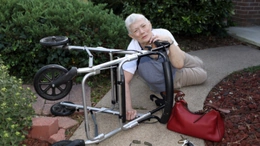Top Challenges In Senior Caregiving And How To Overcome Them

It is a great responsibility to care for an aging loved one, but caring can also prove to be a challenging task. Whether by a family member or a professional caregiver, caring for seniors can have physical, emotional, and monetary burdens that are straining.
Caregivers are used to various challenges every day, say, dealing with chronic conditions or planning their lives.
Being aware of these issues is a prerequisite for establishing a positive, supportive caretaking environment, which will help both the person giving care and the aged individual flourish.
This article examines the issues that are encountered in senior care most frequently and provides suggestions that can ease the care and increase the quality of service.
Understanding The Scope Of Caregiving For Senior
The focus of senior caregiving is wide-ranging and includes the provision of basic activities of daily living as well as providing care to more complex medical situations. The caregivers can be spouses, children, or even employed professionals, and they can be dealing with their problems.
The caregivers, in most instances, leave this role due to a lack of training and preparation. In the long term, providing assistance related to mobility or hygiene mixed with emotional stress can lead to deterioration of the health of the caregiver.
Besides, the caregivers simultaneously play several roles, e.g., full-time worker, children-rearer, house manager, and caregiver of an elderly family member. Millions of family caregivers in the U.S. are unpaid caregivers who care for their aging loved ones.
AARP estimates that close to 48 million Americans provide care to an individual over 50 years old, with a significant number of them devoting more than 20 hours a week to caregiving duties. Not only does this unpaid labor have individual effects, but there are social consequences as well.
Good caregiving does not revolve around fulfilling medical needs but also around carrying out adequate safety, upholding dignity, and companionship.
Countering that, caregiver burnout, frustration, and fatigue also increase as the care requirements of living through the aging process or even sickness do.
Understanding the topmost barriers encountered when giving care to the elderly, and finding the coping strategies and support sources to overcome these barriers, is an essential step in a healthy and successful long-term life of both the caregiver and the recipient.
Common Challenges In Senior Caregiving And Ways To Overcome Them
While there are several challenges in caregiving for seniors, being aware of them and knowing how to solve these issues can be useful in many ways and ease the burden. Here are some common challenges in caregiving for seniors and ways to overcome them:
Emotional And Mental Stress
Caregiving can be stressful, especially when the giver is observing the physical and mental decline of the one he is taking care of. They comprise dejection, worry, guilt, and helplessness.
How to overcome it:
- Seek emotional support: This is achievable by joining caregiver support groups (real or virtual) where a person can help seek a sense of belonging and connectedness.
- Therapy and counseling: Mental health professionals can guide caregivers on how to cope with their emotions through the application of healthy coping skills.
- Put up boundaries: There is nothing wrong with saying no or asking a person to assist you when you are too overwhelmed.
Physical Strain And Health Issues For Caregivers
Physical pain and serious physical load can occur in the course of movement, cleaning, bathing, and moving. As time goes on, the caregivers may develop backaches, joint pains, or even fatigue, especially where they have not received training on body mechanics.
How to overcome it:
- Use the assistive equipment: Transfer equipment, gait belts, and adjustable beds to reduce physical load.
- Put health on the first plan: There is a need to exercise, eat a balanced diet, and rest.
- Training: Join a caregiver workshop or even consult a physical therapist on how to handle patients safely.
Managing Complex Medical Needs
The process of taking medications, keeping track of appointments, and managing various chronic diseases may feel like too much to take on, much less in addition to minimal medical knowledge.
How to overcome it:
- Create a care plan: Write down all drugs, dosage amounts, and frequencies. Keep on track using apps or pill organizers.
- Liaise with medical staff: Have no qualms in requesting doctors to explain or provide assistance when organizing home care services.
- Consider home nursing: In the case of seniors with high care demands, they can avail part-time healthcare support, thus relieving pressure and enhancing their results.
Time Management And Balancing Responsibilities
Most of the caregivers are also employed doing full or part-time jobs or childcare. Because of needing to juggle both caregiving and a personal life, there is a strong tendency to burn out or disregard individual needs.
How to overcome it:
- Prioritizing: Write down all daily tasks and figure out what is important.
- Adopt respite care: Respite care is a temporary relief established as day adult care or workers sent to the house so that the caregivers can take the required breaks.
- Engage family: Share the caregiving role by allocating it among the siblings or the relatives so that the senior can be dependent on them.
Financial Pressure
Caregiving may include unforeseen costs, not only medical costs and mobility equipment, but also the costs of home renovation. Work hours in senior caregiving are cut or the employment of many caregivers is quit, affecting outputs of the household income.
How to overcome it:
- Look into programs and benefits: Medicare, Medicaid waivers, the benefits of veterans, and local senior services can provide financial relief.
- Claim tax credits: Depending on the type of care you provide, there are certain costs you can deduct and might be able to claim dependent care tax credits.
- Provide a budget: Track the expenditure and budget on future care services. You might want to talk to an eldercare financial advisor.
Conclusion
Working with the elderly can be a tiresome but fulfilling career. Emotional, physical, and logistical challenges should not be ignored, as caregivers should take the initiative to seek support and resources to help them find their way as caregivers.
It is possible, provided that one has the right tools, knowledge, and mindset to be able to provide compassionate care and remain well and balanced.






















